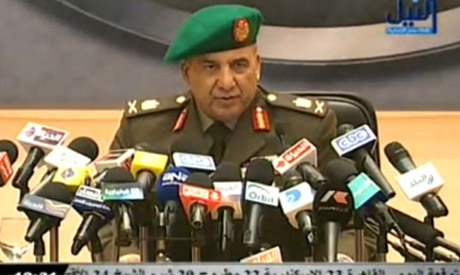
Adel Emara, deputy defence minister and member of the Supreme Council of the Armed Forces (SCAF) (Photo: Egyptian state TV snapshot)
The public prosecutor’s office has challenged statements made earlier this week by Egypt’s ruling Supreme Council of the Armed Forces (SCAF) in which the council claimed that military personnel were simply “defending themselves” during violent clashes that took place in October in Cairo’s Maspero district and those late last month on Mohamed Mahmoud Street.
At a press conference earlier this week, SCAF member Major-General Adel Amara stated that both incidents were currently being investigated by public prosecutors.
In a statement issued Wednesday, the public prosecutor’s office announced that it had wrapped up investigations of both incidents and had referred them to magistrates who would announce results of their own investigations to the public prosecutor’s office. Magistrates answer to Egypt’s justice ministry and not to the public prosecutor’s office.
In a move that surprised observers, lawyer Tarek El-Awadi, head of the Law State Support Centre, revealed that four minors who appeared in video clips shown at the SCAF’s recent press conference had been arrested from their homes on 14 December – two days before clashes began between anti-government protesters and security forces outside Egypt’s Cabinet building.
The SCAF had earlier screened footage from Egyptian television of street children allegedly arrested during the clashes. In the footage, the boys confessed to having been paid to set buildings on fire and make Molotov cocktails.
The taped confessions have already drawn criticism from human rights activists due to the children’s young age. Legal experts, meanwhile, point out that the confessions were broadcast in the media without the permission of the public prosecutor’s office in a blatant violation of the defendants’ rights.
Activists have also noted that, despite Amara’s denial that excessive force had been used against protesters in the recent clashes, he did not deny the veracity of photos – widely circulated online – of a young female protester stripped of her clothes by soldiers and dragged through Tahrir Square.
Short link: